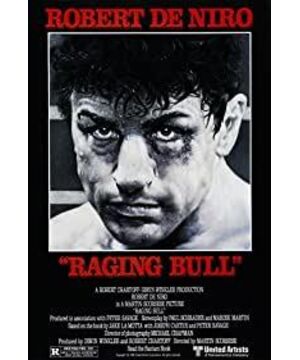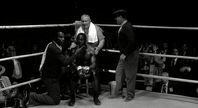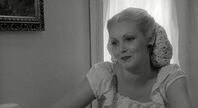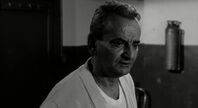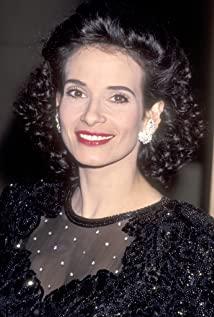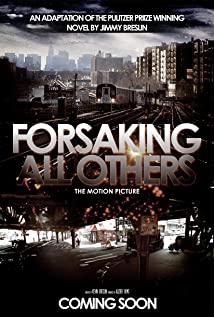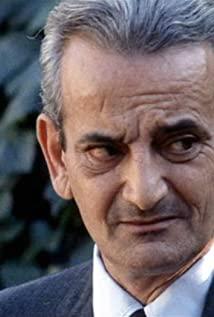The film "Raging Bull" (Raging Bull), based on the real experience of former world middleweight boxing champion Jake LaMotta (Jake LaMotta), the middleweight boxing champion and challenger Sugar Ray Robinson duel, used to be A legend in the 1940s and 1950s. "Crazy Bull" Jack LaMotta through his own efforts and deliberately lost the game "in exchange", not only approaching the boxing throne step by step, but also step by step to the edge of collapse, he was beaten in the ring. Scarred, his sensitive heart is constantly suffering and traumatized by suspiciousness and suspicion.
Cathy Moriarty, who plays Jack's second wife, although she was only 19 years old at the time, she played the role of Vikki so mature and well-versed in the world, making her unwilling to be controlled by Under the husband, it may become an involuntary "vase" placed next to Jack. The alienated and glamorous Vikki is in contrast to the violent "mad cow". She has been "wandering in the rivers and lakes" since childhood and is familiar with the mafia figures. It is no wonder that Jack always rests on her and wonders whether his wife will be there all day long. Have an affair outside. Therefore, Vikki’s growing background or his beautiful face further stimulated the nervous Jack into the abyss of spirit. His distrust of women gradually transformed into a kind of love and hatred, and wanted to succeed in front of him. The complex psychology of Jack; and this psychology also makes Jack see Vikki as his competitor. The victory he wants to win in the ring of life is the absolute possession of his wife who wants to get rid of the control of others.
The driving force of Jack LaMotta on the field of competition is probably related to this possessiveness. When he swings his fists, he disfigures a boxer who even Vikki praises for his good looks (in fact, Vikki should also Just talk casually), Jack looks at his wife like a captain returning triumphantly, as if to imply that you don't have any illusions about this handsome guy anymore. Director Martin Scorsese’s arrangement of female characters often puts them in a “lower” position, being ravaged by language oppression and violence by boxer-like men, like overflowing blood in a match, splashing on them. The faces of female audiences, or the drinks that Jack LaMotta accidentally overturned, fell on the clothes of visiting politicians’ wives, all hinting at the disadvantaged status of women. The irony is that Jack La Motta, who always hoped that he was above the woman, was eventually "returned" by the woman. The wives he experienced were scattered, and he was also deceived by the mature appearance of the underage girl ( Thought she was old enough to perform pornographic services), and went to prison. At this time, Jack LaMotta, like a defeated boxer, self-mutilated and punched the thick wall with anger in the cell covered by the shadows, seeing that people were about to be heartbroken.
As the core actor of the film-Robert De Nilu, if he hadn't tried to recommend Jack La Motta's autobiography to Martin Scorsese, this "Mad Cow" would not have appeared; The success of the film is also largely due to Dinilu’s complete selfless and outstanding performance; in order to integrate into this role, he not only learned boxing with Jack La Motta himself for a year (learned even Jack La Motta is also hard to beat him), and even regardless of his own health, he gained 60 pounds in forty days, becoming another representative of method acting after Marlon Brando (Dinilu Yupian) Zhong also imitated the brando in "The Wharf at the Wind and Cloud"). Jack La Motta, who is constantly climbing to the top, also constantly loses himself. The first seven important games of the film may imply the "seven deadly sins" (including "crimes" such as jealousy, anger, arrogance, gluttony, etc., all in the protagonist’s (Reflected in the body), but in the eighth matchup, Jack was defeated by a cruel opponent (like a cruel life), but was not knocked down, as if it also implied that he would get spiritual salvation. Jack La Motta’s confrontation with Sugar Ray Robinson once again, with a profound slow motion baptism, symbolizes his cleansing of his sins, and in the end he was fiercely attacked by Robinson, and then his heart The pain is "externalized", with the meaning of "atonement" or liberation.
Joe Pesci (Joe Pesci), who plays Jack’s brother, attracted De Niro’s attention due to his performance in the movie "The Death Collector" and was given an audition opportunity for this role. Joe Pesci’s "slip-head" performance style , And the tough and savage protagonist, formed a relationship that is both antagonistic and complementary (It is worth noting that after the younger brother left the protagonist, Jack La Mota, who runs the nightclub, also became "slick." stand up). The brotherhood that director Skothys focused on in the ink seems to reflect the tension between Jack LaMotta and Vikki. He is always wary of women, but he feels more intimate with his brothers. . However, Jack, who was going to collapse in the movie, slowly began to be suspicious of his brother. While adjusting the TV antenna at home, he accused his brother Joey and Vikki of having an affair. This scene started from before the storm. The transition from calm to thunder and lightning, using a long dialogue to highlight the piercing violence behind, the crazy Jack La Motta, at this time, has lost his mind and is completely lost. The relationship between him and his brother Joey has collapsed. , Which means that he has fallen into the darkest abyss; however, at the end of the film, the elderly Jack and Joey in the parking lot are embracing his suspicion affectionately, and as some comments have said, he is finally because of the appearance of his younger brother. The land was redeemed.
The bloody and sweaty "Mad Cow" is said to have been made because Skothys decided to make it into a black-and-white film in order to avoid bloody screen censorship and not want his negatives to fade in the future. Its few color shots are handled by a truck driver. The purpose is to achieve a real "amateur" effect, making it more like a real home video; and this color video expressing the happiest moment in Jack's life is full of With warmth, it is in great contrast to the cold tone of the film's black and white photography (both on the court and the protagonist's depraved life). The film "Mad Cow" has repeatedly used slow-speed shots (especially when Jack is looking at Vikki) to attract the audience's attention. The practice of pulling the background far away and the hazy illusion created by the use of dazzling flashing light bulbs have broken the limitations of the previous boxing movies and formed a very direct impact force.
Thelma Schoonmaker, who is in charge of editing this film, has officially become Martin Skosis’s "Queen" editor since the movie "Mad Cow". Her outstanding skills can be directly used as a model or teaching material. Many film school students have benefited a lot. Like the end of the eighth boxing match, she used quick and messy editing techniques to show that Jack was beaten by Robinson to a state of blurry consciousness. There are also sometimes noisy, The restless picture, the smooth connection with the detailed close-up of the characters, all show Schoonmaker's profound skills. One of the special features of the movie "Mad Cow" is that the soundtrack is mixed with crowd noises, animal howls, and flashing blasts... These special sound effects undoubtedly strengthen the fierce or tragic boxing match. In this situation, the audience can not only visually (shoot at close range), but also acquire a sense of presence in the audience.
The black-and-white style "Mad Cow" is different from previous boxing movies. When the protagonist becomes more and more proud in the ring, his heart becomes more and more degenerate; as his life becomes more and more. When it was a terrible defeat, the protagonist was rescued spiritually. After gaining weight, Jack Lamotta, although he was arrested and imprisoned, and showed compassionate despair, but he was given a chance to reflect and restart his life in prison, as quoted at the end of the film "The New English Bible, John IX" said: "I only knew that I was blind for a time, but now I can see my surroundings."
Martin Scorsese, who has directed "Taxi Driver", was caught in the crisis of creation and life because of encountering Waterloo in the musical "New York, New York" and being affected by the frustration of marriage. After reading the biography of Jack La Motta, he felt as if he felt the same, and found resonance. Through the production of the movie "Mad Cow", Skothys gradually got rid of the entanglement of drug addiction and opened his own inspiration. Men (the eighties and nineties of the last century was Martin Skosis’s golden creative period), he really understood what “rebirth from the fire” is like being hit hard by a ruthless and fierce fist, still standing in the ring The same as Jack La Motta on the top.
View more about Raging Bull reviews


